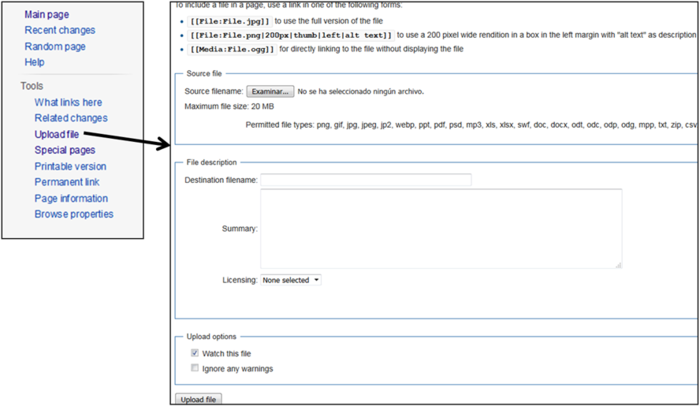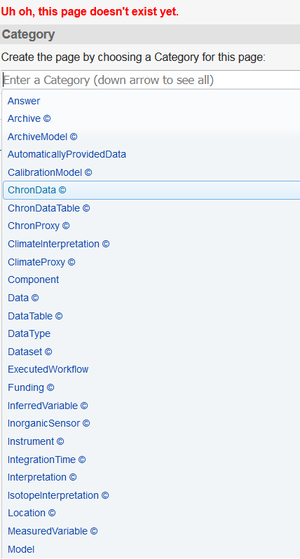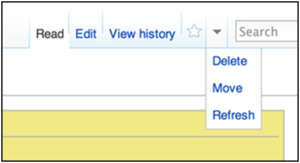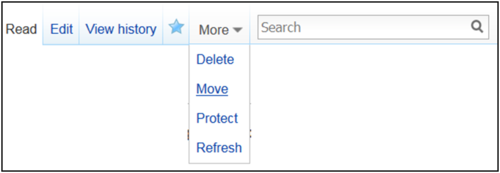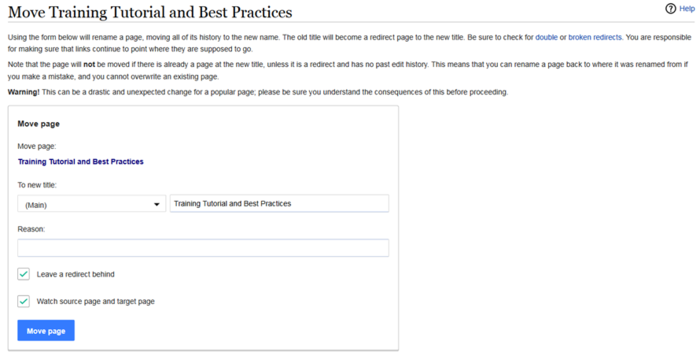Quick Guide to Editing Wiki Pages
Once you are registered, you can start editing existing pages, creating new ones, and move/delete obsolete pages. The pages you are allowed to edit depends on your editorial level.
This guide provides basic instructions on how to use the MediaWiki format. If you require more help, use this Help or contact us.
The quickest way to figure out how to do something is to find and example of what you want to do from another page, or on Wikipedia, and copy the source code from there.
Contents
Editing existing wiki pages
Quick Markup Guide
| What it looks like | What you type |
|---|---|
|
Italic Text |
''Italic Text'' |
|
Bold Text |
'''Bold Text''' |
|
Bold and italic |
'''Bold Text''' |
|
|
<strike> strike text </strike> |
Section Headings and Lists
| Description | What it looks like | What you type |
|---|---|---|
|
Headings
|
Level 2Level 3Level 4Level 5Level 6 |
==Level 2== === Level 3=== ====Level 4 ==== ===== Level 5 ===== ====== Level 6 ====== |
|
Bullet List |
|
* Level 1 ** Level 2 *** Level 3 |
| Numbered List |
|
# Level 1 ## Level 2 ### Level 3 |
| Comment |
Comments are visible only in the edit zone |
<!-- This is a comment --> Comments are visible only in the edit zone |
Links
Internal Links
| Description | What it looks like | What you type |
|---|---|---|
|
Internal Link |
[[Main Page]] | |
| Piped Link
Use different text for the link |
[[Main Page|Go to the Main Page]] | |
| Word-ending links, following so called "link trail rules" | [[Marine Sediment]]s | |
| Internal Link to the current page's talk page |
[[{{TALKPAGENAME}}|Discussion]]
| |
| Internal link to an image or a file of other types | media:PSM.jpg | [[media:PSM.jpg]] |
| Internal link to the user's user page | Special:MyPage | [[Special:MyPage]] |
External Link
| Description | What it looks like | What you type |
|---|---|---|
| External link | https://www.wikipedia.org | https://www.wikipedia.org |
| External link with different label | Wikipedia | [https://www.wikipedia.org Wikipedia] |
| Numbered external link | [1] | [https://www.wikipedia.org] |
| Mailto link | email us | [mailto:linkedearth@gmail.com email us] |
Images
To insert an image into an article (For a LiPD file, use this page), click on the "Upload file" button in the lefthand menu (Figure 1).
First select the document you want to upload, then just hit the "Upload file" button at the bottom of the page.
Be Specific in the name file: If you wish to upload a picture of your archive, do NOT name the file 'MyArchive.jpg'. Read the Best Practices guide to learn how to properly name your file.
This file can then be referenced using an internal link described above.
Tables and Equations
Tables and equations are more complicated. For a more thorough explanation, see Wikipedia's pages on formulas and tables.
Tables
The following code
{| class="wikitable"
|-
|+Table 1.
|-
! Header text 1 || Header text 2 || Header text 3
|-
| Example 1 || Example 2 || Example 3
|-
| Example A || Example B || Example C
|-
| Example ! || Example @ || Example #
|}
results in:
| Header text 1 | Header text 2 | Header text 3 |
|---|---|---|
| Example 1 | Example 2 | Example 3 |
| Example A | Example B | Example C |
| Example ! | Example @ | Example # |
Equations
Equations use the LaTex markup language and are bounded by <math> and </math> tags. For instance, <math> \delta^{18}O_{SMOW} = 1.03091 (\delta^{18}O_{PDB}) +30.91 </math> results in:

References
All references consist of a citation and an actual reference. The citation is a tag that contains a shorthand form of the reference, and is followed, on first use in an article, by the completed reference.
The LinkedEarth wiki uses APA style for citation
To create a reference:
- First citation in the article:
Khider et al. <ref name = Khider_2014> Khider, D., Jackson, C. S., & Stott, L. D. (2014). Assessing millennial-scale variability during the Holocene: A perspective from the western tropical Pacific. Paleoceanography, 29(3), 143-159. doi:10.1002/2013pa002534 </ref>
becomes Khider et al. [1]
- Subsequent citations
Khider et al.<ref name = Khider_2014 />
will automatically create a footnote marker that will link to the original reference: Khider et al. [1]
Creating a new wiki page
To create a new page, type the link into your browser: http://wiki.linked.earth/New_Page and replace "New Page" above by the name that you want for the page.
Then, either select a category for this page (Figure 2):
or, just click on the "Create" link to create a page without any category (Figure 3)
Alternatively, you can search for the page you are looking for (remember that the wiki is case sensitive). If the page does not exist, you will be prompted to create it. You should always try to look for the term you want to define before creating a new page to avoid duplicate pages of similar concepts.
Deleting an existing wiki page
Go to the page you want to delete and select "Delete" from the drop down menu as shown in Figure 4.
Click on the "Delete" link, and delete the page. You will be prompted to give a reason for the deletion.
Renaming wiki pages
Wiki pages may need to be renamed because of typos in the page name or community agreement to rename a term in the LinkedEarth ontology. In order to rename an existing page without losing any of its contents, you should click on the "Move" button under the "More" menu on the top of the page (Figure 6)
You will be prompted to enter the new name for the page and a reason for the change.
